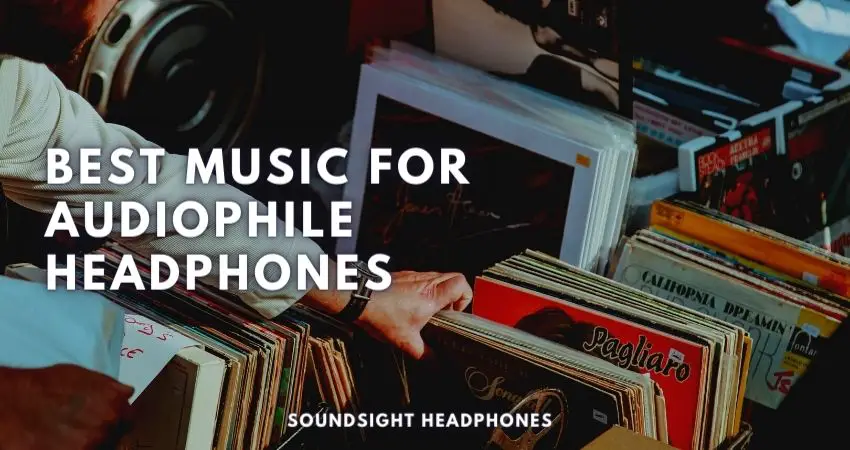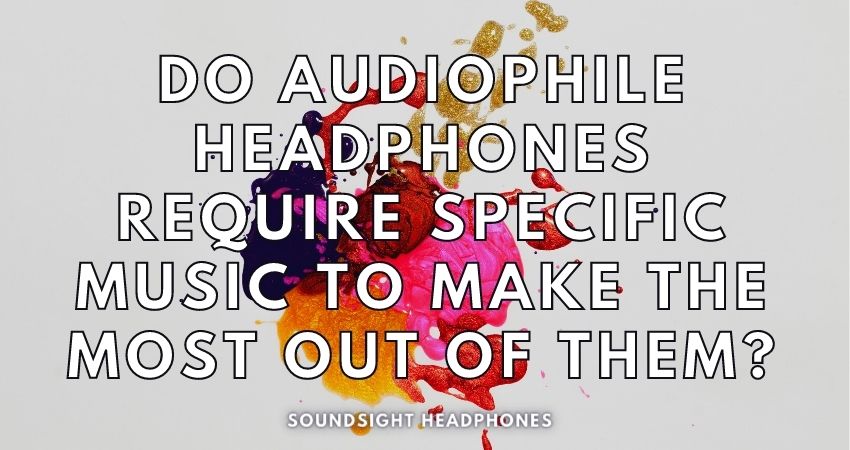Audiophile headphones entail plenty of positive aspects, from flawless engineering and materials to attention to detail and design (just take a look at ZMF and Focal). However, they do have one drawback: they’re so revealing and accurate that not all music sounds great on them. The music has to be just right for high-fidelity headphones to shine. Specifically, the headphones need high-quality recordings in order to make the most of their capabilities. LINK HERE
The article explains if audiophile headphones can sound good with any music or if specific music is required to take advantage of their strengths. Additionally, I’ll answer why audiophile headphones are so demanding, which recordings can be used to get the most out of them, and which music genres aren’t ideal for music listening with audiophile headphones.
Hi-fi headphones need music that meets certain conditions – Here’s why
You can use audiophile headphones just like any other pair of headphones, but you’ll find that they require specific music to make the most of their strengths. Their reproduction is mostly accurate, which means you can enjoy fairly “clean” recordings, such as classical and jazz, in a way you’ve never experienced before.
Audiophile headphones are designed for audiophiles, for people who are looking to get the most out of their music, reproducing music in a more organic way, different than the average person is used to or prefers. So there’s no point in buying audiophile headphones if you have no appreciation for fine music and don’t have a collection of high-quality recordings.
Let’s say you like simplicity in music and have a preference for techno, house, or similar genres. In that case, don’t bother with audiophile headphones because you can get a similar or even higher level of enjoyment with the cheapest Beats headphones or a pair of regular headphones from Walmart.
Why audiophile headphones are so demanding
Audiophile headphones have very sophisticated drivers with high stiffness to mass ratio. This means the drivers can move faster and have greater precision and control, which makes them more sensitive to timing cues and less prone to distortions in the signal.
Audiophile headphones are at the higher end of the price spectrum because of their superior sound reproduction and finesse. They’re also a bit strict about the type of audio content they work best with. As such, audiophile headphones need good quality audio content for the following reasons:
Detailed-oriented headphones designed for full-range music
Audiophile headphones are designed to ‘grab’ the details from the music, making them fantastic for playing rich genres of music like classical, certain types of jazz, orchestral music with large orchestras and large choirs, chamber music, and very detailed acoustic music.
Because of the nature of audiophile headphones and how well they reproduce and reveal each and every subtle musical note in the track, certain music genres are not ideal for use with high-fidelity headphones. Simple musical genres with ordinary, repetitive drum beats or bass lines without much dynamic range or instruments with an organic, natural sound may not give high-fidelity headphones a chance to reveal their true potential.
Hi-Fi headphones need quality recordings
Not all recordings were made to a high standard, and flaws can appear consistently in some pieces of music, such as room reverberation, poorly recorded vocals, poor mastering, or due to low sampling rate, or low bit depth recordings.
Distortion and other acoustic artifacts may also be present in your music as a defect in your headphones. Still, the recording quality must be flawless to enjoy the music to the fullest, regardless of your headphone shortcomings.
Low-bit-depth recordings can also be problematic because they contain more digital noise, which compromises the fidelity of the music that is noticeable on high-fidelity headphones. This can lead to a loss of detail and harmonic richness.
Trying to improve a poor recording by oversampling or equalization can help, but the result is usually not promising. In the worst case, information is lost, and distortion can become even more present.
Overwhelming for everyday audio applications
Audiophile headphones are overkill for daily tasks like online conferences, watching YouTube videos, and, at times, even for music. There are very few situations where audiophile headphones can be justified by the needs of the mainstream consumer.
In online conversations, the soundstage and clarity reproduced by open hi-fi headphones like the Sennheiser HD 800 tend to be so well-developed and emphasized that you can hear the lips of the participants in a Zoom meeting or a badly recorded podcast or YouTube video. The sound quality is so great and so annoyingly revealing that sometimes the amount of detail you weren’t supposed to hear starts to bother you.
The breath of the musician when they breathe in between notes, the breathing of people you converse with on Skype or Discord. The tapping of fingers on a keyboard, nose-blowing, the clicking sound of a pen hitting the desk, and when people wet their fingers to flip pages in a book or magazine. All of these tend to be heard easily and clearly with audiophile headphones, making them inadequate for these tasks and, at best excessive.
Audiophile headphones require other hi-fi equipment to make the most out of them
As standalone systems, audiophile headphones can provide a fantastic listening experience, but it’s when paired with good compatible hi-fi equipment that listeners can enjoy their full potential. This means you need to make sure the music you play through your headphones is good, comes in high-res audio format, and is properly converted from digital to analog for the best sound quality.

What to listen to take advantage of your audiophile headphones
You can get the most out of audiophile headphones when you have a certain type of audio content for them – properly recorded rich, instrumentally complex music genres in high resolution.
High resolution, high quality recorded music
To take full advantage of audiophile headphones, you need to use high-quality recordings from audiophile labels (or high-resolution audio albums). CD audio files have a great sound quality and are the most popular source for high-resolution audiophile music. On the other hand, if the music on the CD is synthetic or lacking in harmonic richness, audiophile headphones will be unkind to it.
Because MP3 files are restricted to 16 bits and 44.1 kHz, FLAC files provide a slight improvement in sound quality and are the way to go if you use high-res audiophile headphones.
If you’re an audiophile, you’ll want to take advantage of high-res audio files (24 bits/192 kHz) when available and stop listening to online streaming platforms that compress your music. The best way to listen to music is by downloading high-quality FLAC files or buying high-res audio albums. Still, you have the option of listening to lossless audio on platforms like Apple Music, Spotify, or Tidal (via MQA).
For audiophile headphones to deliver the best sound quality, music must be recorded with the best practices and the greatest attention to detail and accuracy. Complex, high-resolution music benefits most from audiophile headphones because it contains more bits of audio, allowing more information to be expressed. The same is true when a song is recorded traditionally.
Rich and intense musical genres
Acoustic recordings are well-suited to this type of headphone, as the sound is reproduced cleaner and more organic. Songs that contain a lot of high frequencies are very dense and complex (like classical, jazz, metal) or have strong percussion benefits from audiophile headphones.
Suppose the music is very rich in frequencies, requiring a good soundstage to unfold a great instrumental arrangement. In that case, audiophile headphones can be essential to give it a more realistic feel and bring out all the nuances and details that comprise it.
If your music is electronically produced and has a less organic approach, it’s likely that audiophile headphones won’t achieve their true best. But they’ll still offer good sound quality and benefit you vastly.
Audiophile headphones are ideal for the following music genres:
- Classical music (Baroque, Romantic, Chamber music, Opera, Orchestral and Vocal music)
- Blues music, Folk music, World music, Country
- Experimental music, Funk and Hip hop, and other music genres with complex beats and rhythms
- Jazz and other Jazz music genres (New-Orleans jazz, Avant-garde jazz, Jazz Fusion, etc.)
- Indian music, Latin music, and other world music genres.
- Rock music (Metal, Progressive rock, Indie rock, Alternative rock)
Audiophile headphones won’t sound great with the following types of music:
Unfortunately, not all music is made to listen to with an audiophile headphone. Indie, Pop music remixes, TikTok slow remixes, Techno, Dubstep, Mumble Rap, SoundCloud Rap, EDM, Lofi. Most of these genres are catchy, entertaining, and energetic or loud to keep people’s attention but don’t need audiophile headphones for proper listening.
FAQ
Will the music sound better if I buy a pair of audiophile headphones?
If you are using a standard pair of headphones, the sound of your music will certainly improve with hi-fi headphones. However, don’t discount the recording quality of the music you’re listening to. Many songs sound good with ordinary headphones because you are not able to distinguish many things, and you miss sounds that are present in professional studios. Audiophile headphones can bring out audio details that enhance the listening experience or make the song sound “off” and different.
On the other hand, likely, you are already listening to poorly recorded music without even knowing it. By buying a pair of audiophile headphones to correct a bad song, you only amplify the sound quality problem. Take, for example, a song that sounds too soft to your ears on regular headphones. After you buy audiophile headphones, the same song sounds even more colorless, with additional mixing & mastering flaws emerging.
Do audiophile headphones sound better or worse than standard headphones?
Audiophile headphones have superior sound quality, capable of reproducing music with more accuracy and less distortion. As such, audiophile headphones sound better than standard headphones. However, while good sound is objective, people’s preference for sound quality is subjective. Some people like the warmer, more basic sound of less common headphones, while others prefer a tighter, clearer, more detailed sound.
Ultimately, you get better sound quality with audiophile headphones, regardless of your taste and preference, and the sound is much more customizable and easier to equalize because there isn’t as much distortion. As a result, you can enjoy audiophile headphones in a whole new way.
Conclusion
To conclude, the ultimate reason why audiophile headphones are not a good fit for everyone is that you may not consume the kind of music that can make the most out of them.
Though the music quality may improve dramatically when you upgrade to a pair of high-fidelity headphones, the worst thing to do is to buy audiophile headphones for applications that don’t fit their purpose. For this reason, you should learn what to consider before buying audiophile headphones. LINK HERE
Suppose this is your first time buying audiophile headphones. In that case, it’s best to listen to songs with a pair of budget audiophile headphones like the Philips SHP9500, Samson SR850, or Audio-Technica ATH-M30X before diving into much more premium audiophile headphones.
